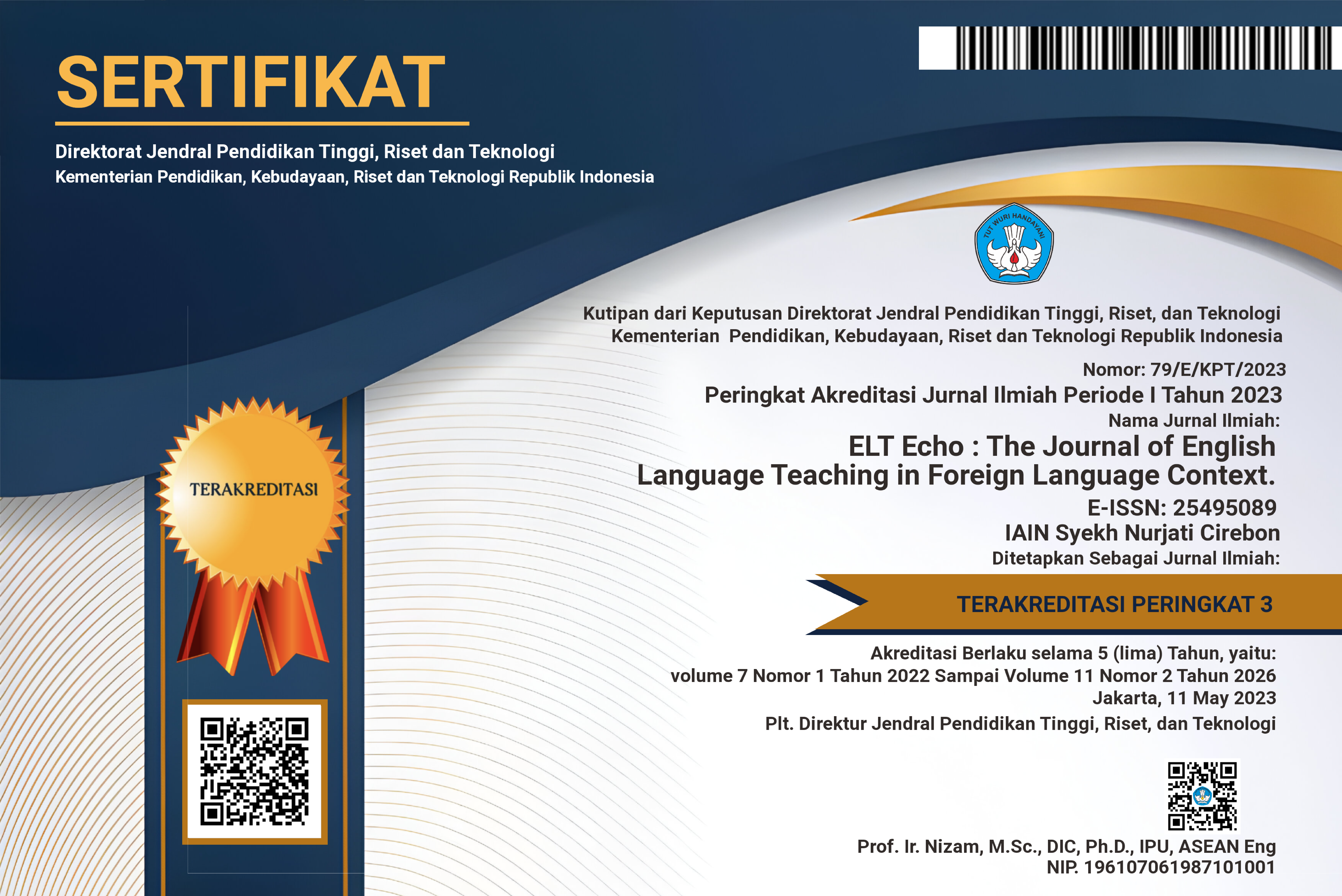INVESTIGATING A PROFESSIONAL TEACHING of THE NEW LECTURER in INDONESIA
(1) Universitas Islam Malang
(2)
(*) Corresponding Author
Abstract
 The concern held on this issue vary in term of English language teaching practices especially teaching speaking by the new speaking lecturer of University of Islam Malang (Unisma). The descriptive qualitative study was then designed in order to describe the teaching speaking activities by the new speaking lecturer of Unisma. Twice classroom observatios were conducted in two different speaking classes. Moreover, the new lecturer and ten students from speaking II D & II E were also invited to join twice interviews. By the same token, simple questionnaires which consists of thirteen questions were also distributed to know students’ involvement during speaking class. From the investigation, it was found out that the new lecturer has implemented procedural teaching performances such as preparing teaching activities – designing lesson planning, teaching journal and course outline, executing the plans in classroom – creating group discussion, presentation and individual task, and assessing the progress after teaching and learning activities such as implementing oral test. Moreover, the observed students were motivated by the new lecturer teaching way. Additionally, the new lecturer only implemented ICT based learning as the supporting way to facilitate her teaching not as her main media.
Full Text:
PDFReferences
Achmad, D. & Yusuf, Y. Q. (2014).Observing Pair-Work Task in an English Speaking Class. International Journal of Instruction, 7(1): 151-164.
Beauchamp.C & Thomas.L. (2011). New teachers’ identity shifts at the boundary of teacher education and initial practice. International Journal of Educational Research50.p 6–13.
Bogdan, B. (1998). Qualitative Research for Education. USA: Allyn & Bacon.
Costalesa.A. F, &MartÃnezb. A. C. L. (2014). New approaches in English language teaching: teacher training in the framework of content and language integrated learning. Magister.26. p 18-24.
Dashtestani, R. (2015). Towards integrating Computer-based Testing (CBT) into the EFL curriculum: Iranian EFL teachers’ perspectives on challenges and obstacles. Asian EFL Journal. p, 134-163.
Gudu, B. O (2015). Teaching Speaking Skills in English Language using Classroom Activities in Secondary School Level in Eldoret Municipality, Kenya.
Krause, K.L & Coates, H. (2008) Students’ engagement in first-year university. Griffith Institute for Higher Education, Griffith University, Mount Gravatt, 4111, Queensland, Australia
Krashen.S. (2005). Is in-school free reading good for children? Why the national reading panel report is (still) wrong. The Phi Delta Kappan, 86(6). pp. 444-447
Levy. D. C. (1972). Creativity and the new teacher.National Art Education Association.(25)7. pp. 6-9. Retrieved from: http://www.jstor.org/stable/3191772
Maskat, N. (2010). New Teachers’ Perception on the new academic staff pedagogical training module’s learning logs – A report from a pilot study.Procedia Social and Behavioral Sciences.p, 376–382.doi:10.1016/j.sbspro.2010.10.051
Miller, J. (2003). Audible difference: ESL and social identity in schools. Clevedon: Multilingual matters.
Richards, J. C., & Lockhart, C. (1996). Reflective teaching in second language classrooms. Cambridge: Cambridge University Press.
Richard, J.C. (2013). Curriculum approaches in language teaching: Forward,central, and backward design. RELC Journal 2013.44(5). DOI:10.1177/0033688212473293. Retrieved from:http://rel.sagepub.com/content/44/1/5
Swaak. J, de Jongw. T & Van Joolingenz W. R. (2004). The effects of discovery learning and expository instruction on the acquisition of definitional and intuitive knowledge. Journal of Computer Assited Learning. 20. Pp225-234. Backwell Publishing Ltd.
DOI: 10.24235/eltecho.v3i1.2680
Article Metrics
Abstract view : 555 timesPDF - 150 times
Refbacks
- There are currently no refbacks.
Â
This Journal is indexed by:
Â

This work is licensed under a Creative Commons Attribution 4.0 International License.










